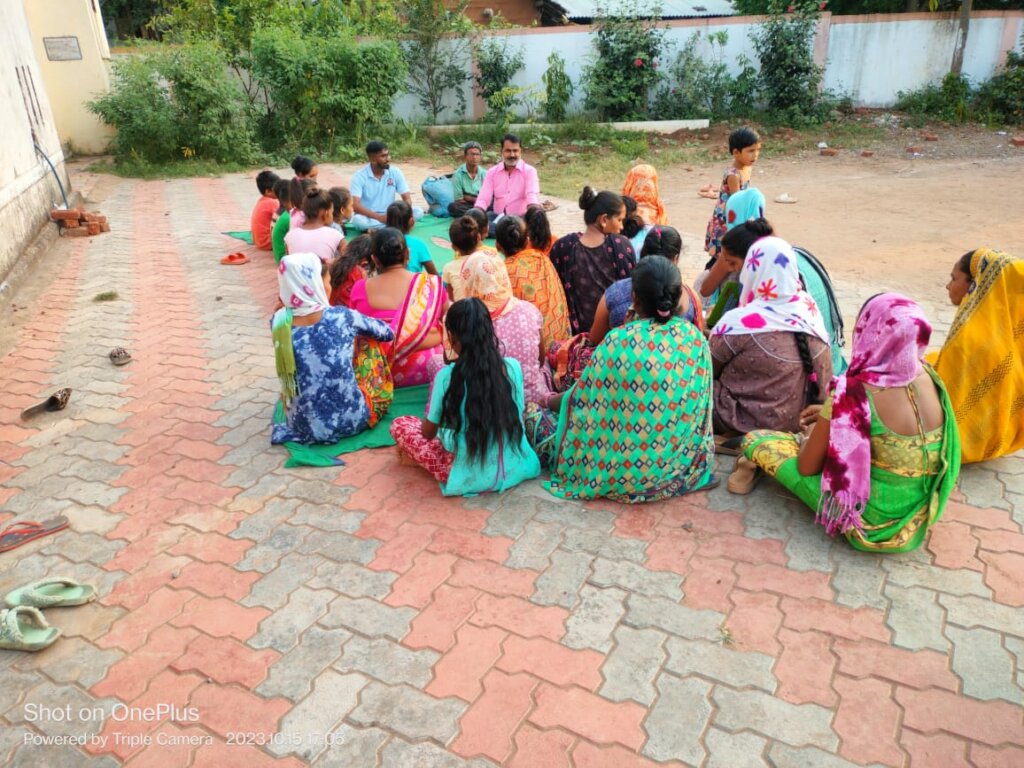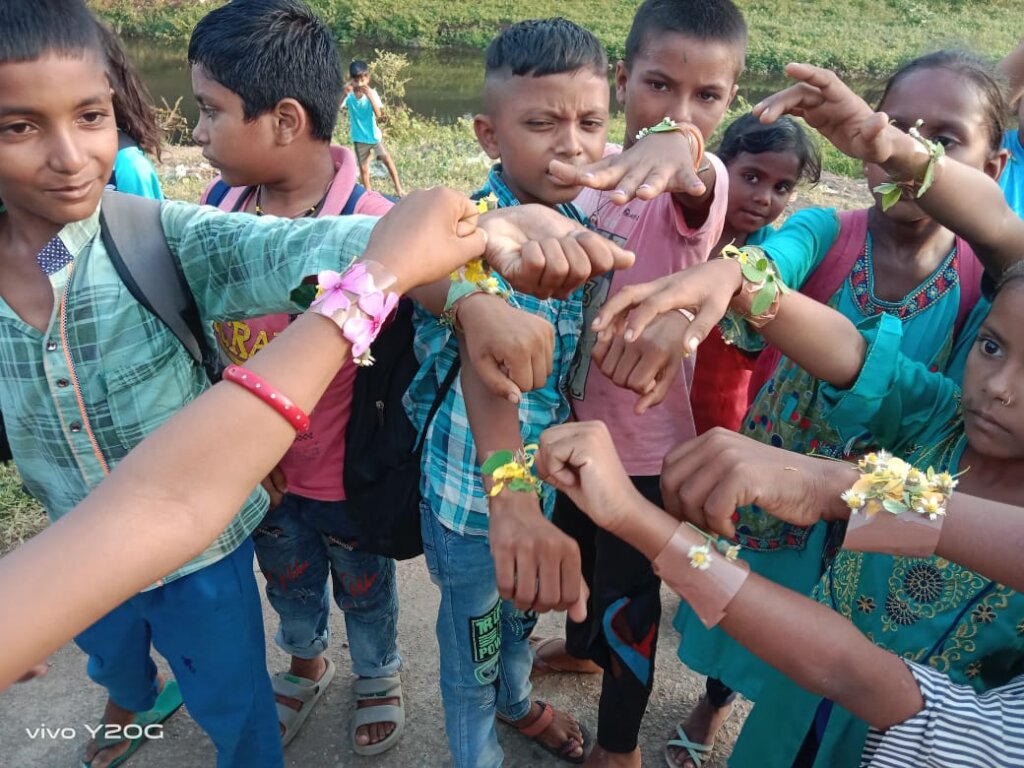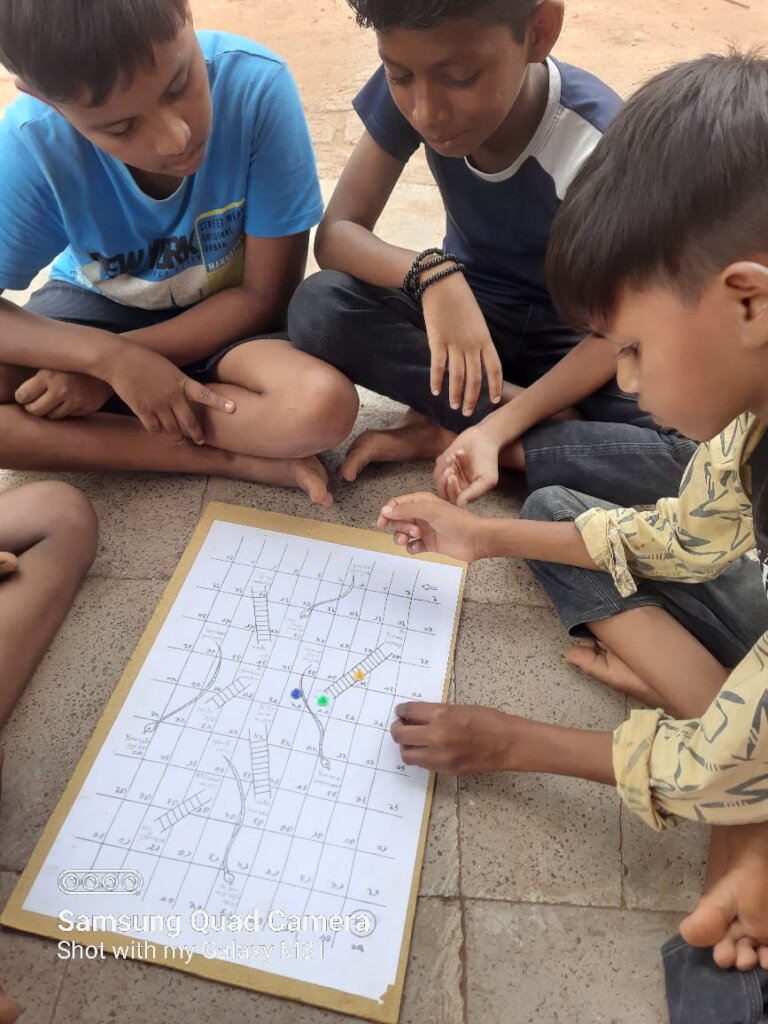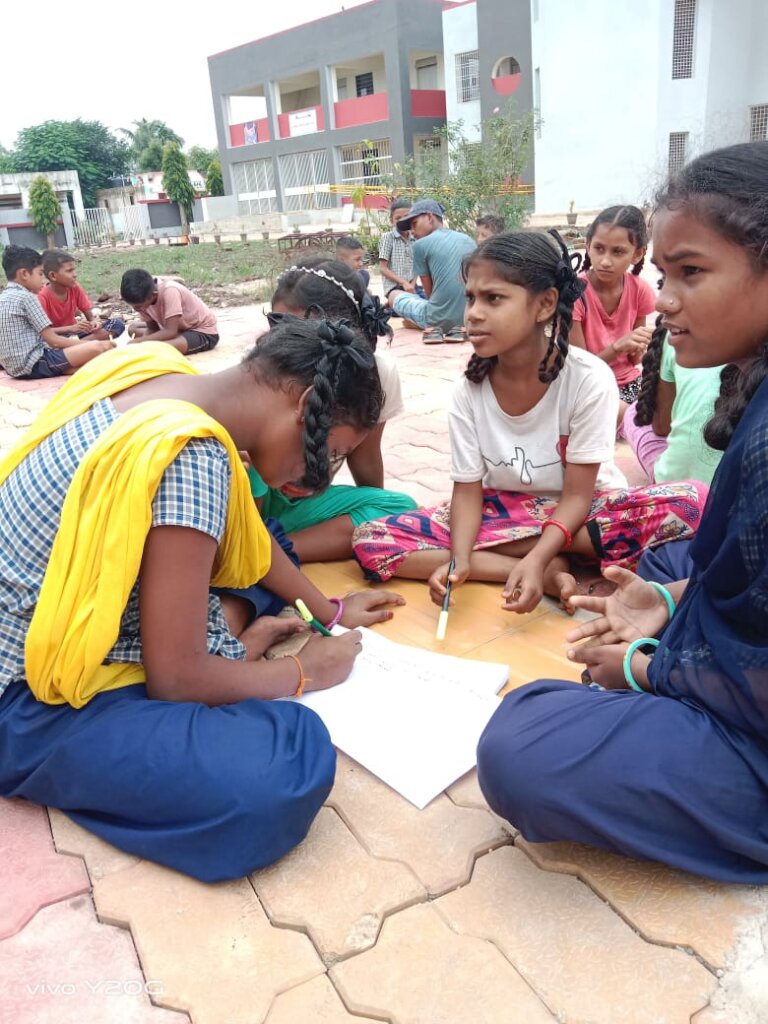By Lijimol | Program Organizer
From the month of July Aaranyak programmes continued its interesting activities in schools and villages. We completed our Baselines surveys in villages and schools and updated our General Registers. This Academic year we will be engaging with 729 children. The schools also began functioning in after settling all the paper works in June and classes were also functioning in full capacity. We began with educational and creative activities.
The baseline survey of the children in Aashramshala were completed and this year we are engaging with a total of 1602 children, comprising of 788 boys and 814 girls of 11 Aashramshalas.
Networking and Liaisoning
The Block Taluk Primary Education Officer at Dediyapada block was met in the month of July. Shaishav and Aaranyak’s program were introduced to him, and we went to him to get permission for our activities in schools. He was impressed with our engagements with children and suggested Aaranyak team to expand our activities to three other remote villages in the respective block. After a general visit to the suggested three schools, we have decided to begin operations in these respective places after some time due to increased logistical issues.
Notebooks donated by an individual donor was distributed among all the children of Aashramshalas. This also built a good relation of Shaishav with the school administration.
Activities
The activities were separately planned for Balvatika and Class 2nd. Activities which were primarily fun and that induced learning and curiosity for them.
The Child Friendly Village team also began to visit the Almavadi school, at the Almavadi village. This was as per the request of the children of the Sejpur village (CFV program already functions here) who goes to these schools. The teachers in these schools also agreed to our request and hence we began our activities in the school.
BALMELA
We began with Bal mela in all the 12 schools including the newly added Almavadi school. The Balmela focussed on stories, introductions, activities that encourages more interaction among the children.
The Aashramshala team conducted Balmela on critical thinking, curiosity in the month of August. The mela included all the components that created a fun but inquisitive environment for children. The games and resources stimulated the children to think beyond their usual games and school activities to solve them. It was observed that children were also completely focussed on these games.
Balmela on Child Rights was done in the month of September. This constituted of the board games on the four child rights of life, protection, participation, and development. Along with these games discussions were on POCSO Acts, Juvenile Justice Acts, RTE and other relevant legislations in a language children understands, especially in the local context. The issue of Child labour was also discussed. Children were also made aware of the concerned authority to seek redressal and approach in situations of concern. It was refreshing to see children taking notes of the child rights session without any requests by the team members.
POINT ACTIVITIES
We wanted to continue the journaling exercises that was initiated during the Vacation camps. Activities on emotions focussed on giving diary writing prompts, such as the person closest to one’s life, the happiest moment, biggest lie told etc.
The children of Almavadi school were excited with the Balmela activities and the subsequent activities. Here we executed more educational and hands on activities like Gujarat Jodo and Bharat Jodo and concluding with discussions with Gujarat Safar. These informative sessions were equally enjoyed by children and appreciated by the teachers in the school.
Educational activities were centred on Numerics, Fractions and Languages. The basic arithmetic was made fun and interesting through the game of formulating equations for an answer rather than finding the answer. This prompted them to think beyond mathematical
solutions.
With the help of efficient TLMs we were able to organize Gujarati language sessions. The activities encouraged children to find the alphabets in nature and improve their skills.
Creative activities like thumb painting, thread painting, using imagination to finish a picture and a lot more activities of the same genre were regularly completed with children.
In the month of July, 675 boys and 663 girls were formed into peer groups in 11 Aashramshalas. Aside from activities on emotions, focus inducing, and leadership activities were also done with the children in Aashramshalas,
The movie ‘Makdee’ was screened in the villages and schools. The children enjoyed the movie, but his also led to some good discussions on believing, especially ghosts and village folk tales. The movie becomes relevant as the children in the villages are frightened about ghost stories and they sadly take these stories seriously. The movie also reminded the importance of questioning and not to believe in anything without evidence.
The movie screening went well in the villages and schools. The children were seen to be showing initiative in arranging the set up for the screening. But in Aashramshalas, there were instances of recurring power failure that disrupted the atmosphere. But it was dealt constructively by the team with quick recaps and brief talks on film.
ADOLESCENT SESSIONS
Adolescent programmes were also initiated in villages with considerable number of adolescents.
The adolescent sessions were on the topics of “What is a girl, what is a boy?”, Body mapping and physical, mental, and emotional changes that occur during puberty. The topics were the least explored topics for the children of Child friendly village program. But the children actively participated in the group work and patiently listened to the post discussions. Various existing gender roles and responsibilities were revisited by children.
In Aashramshalas, a recap of the adolescent sessions was carried out. It was on the above said topics and included interesting activities like Baby Born, Sociogram, Gender Box, and games that insighted on the disproportionate working hours of men and women.
Through these games most of the children acknowledged and realized that gender discrimination exists in the society around them, even in their schools.
Despite of our efforts, we still observe children finding it difficult to mingle and talk with each other. Our ice breaking games before the Adolescent sessions are particularly aimed to address this problem.
BALDOST SAMITI
Baldost samiti’s also started functioning in all 14 villages. We also began experimenting with child rights games with these adults to induce a conversation around child safety, protection, and development. The attendance in these meetings is low in these initial days as adults need to balance the farming and household activities, so they skip these meetings despite our talking. But the Child rights games are providing positive engagements. The children are also found participating with the elders and making them understand about the rights. Bal dost samiti meetings are done every month in every village to continue the conversations and on an average 8 adults have attending for the past three months.
BAL SAMITI
Bal samiti forms a critical component of Vanshalas. In the two Vanshala operational villages, Bal Samiti happens every Sunday in the beginning of the month. The quality of engagements of children is observed to be improving with time. Their demands are getting more meaningful and thoughtful.
Children groups (Bal Samiti) were also started in all 11 villages. Currently, the responses from the children are feeble as in most villages. The children in most of these villages are of small age, so this affects their understanding level in demanding what they want to learn. We also believe it takes a great deal of time for the children to qualitatively grasp the concept of self-learning and exercise it.
CELEBRATION OF FESTIVALS/IMPORTANT DAYS
In the month of August during the week of Independence Day, children were engaged in National Flag making and associated writing activities. An award winning and thought provoking Canadian short movie Neighbours was screened in the villages and schools. This really instigated conversations on fraternity and feeling of oneness with each other's despite of differences. The discussions were made relevant with adding pointers on violent events happenings in Manipur and other religious conflicts. Children also played dram on Gandhiji based on stories in book.
At the International Indigenous Day celebration, the children in Vanshala program excitedly carried out a 40-year project in two villages of Samarpada and Pomelapada. The children interviewed the elders in the community to understand the phase of changes that they witnessed in the village for the past 40 years. It was indeed an exploratory study for the children. Questions dealt with childhood experiences, agriculture, weather, facilities during their (grandparents) time. Children were super excited to visit and interact with these elders. The children diligently recorded this information that came out of their questions in their notebooks. They learnt how the school in their village was in a kachha structure, and with the absence of mobiles, people met each other every day and sat down together in the evening. They also learnt that their elders used to eat only what they grew, and that most of them went for work to a nearby Parsi farmer who had around hundred acres of land. The wedding procession happened in bullock cart and instead of DJ (which is the present trend), there were Dhols and Shehnais. There was also no electricity or Primary Health Centers in the village either. Elders used to store their grains in bamboo and soil unit and would wash their hair with soil and milk. Senior citizens and elders felt recognized and appreciated when they were approached as a source of information.
Children celebrated Raksha Bandhan by making their own Rakhi's and tied it to their loved ones.
On the month of September, children learned basics of Indian Sign Languages (ISL). This was a unique learning for them, and they excitedly captured the signs. This was planned during the week of World Deaf Day; Children were also made understood about the need of inclusivity in the social space by showing them video with audio off and other videos with the sign language interpreter.
PROJECT BASED LEARNING
The Project based learning was majorly focused on children exploring the edibles in the forest. Especially those herbs and plants that can be used for cooking. An extension to this project was identifying and documenting the medicinal plants.
Another project children did was to make a Sun Watch and observe the changes in the shadows as time passes. This gave a firsthand experience of the everyday science that happens around them.
PROGRAM BY CHILDREN
One of the Program demanded by children was the making of mud Ganesh idols during the Ganesh Chaturthi festivals. It was an initiative on their part, and they created beautiful hand designed small idols. This occasion was also used to make children introspect the essentiality of making huge idols of Plaster of Paris (PoP) materials and dipping it in the water bodies that can cause pollution at all levels. Children celebrated the religious ceremony in a much more responsible and sustainable way.
Another program demanded by Children was ‘Science Fair.’ Children decided to make groups and produced different experiments, and principles behind the same. On the day of ‘Science
Fair’ children performed it in front of other children and explained its mechanism and principles behind it. Experiments were based on principles of pressure of air, how warm air and cold air interact with each other, importance of air for water flow, etc.
ONE DAY CAMP
Health and Personal Hygiene activities were taken as theme for the One-day camp in September. There was widespread conjunctivitis health concern in the village and schools that made this topic relevant. The session started with children washing their hands in a tumbler without any soap and in the end, they observed the water’s color. It made them realize the dirt in their hands. This is followed by board games and chit games on this topic, sessions on identifying external factors that affect one’s health, such as (air, water, soil, food), a session on types of waste around us and diverse ways of segregating it and a finally, a Focus group Discussions (FGD).Children deliberated and produced pointers on how to maintain one’s own hygiene. Usually, non-residential training is held with only the older children, but we facilitated it with both younger and older children because of the relevance of the topic.
Wenlido trainings
Six Wenlido trainings that covered 136 girls of ages of 11, 12, 13 were completed in this reporting period. The girls showed more confidence in expressing themselves in the last days when compared to the initial days. The girls also understood the existing power hierarchy in their society and the invisible violence around them.
Staff exposure visit
In the month of August, the Aaranyak’s 16 team members visited two organisations as part of our Exposure Study Visits. A greater understanding of Adolescent programmes and resources were captured at SEWA RURAL organisation based in Bharuch district. Later we visited the SAHAJ-SHISHUMILAP, a non-profit based in Vadodara. The complexities and mechanisms on engaging Adolescent programmes with the children in urban slums were also deeply explored in this place. The visit has led to creation of more ideas for programmes and resources that needs to be contextually replicated in our project areas.
Stories of Change
The girls in the tribal areas are usually shy and do not speak up. During our Wenlido training it takes a day or more for them to warm up and express themselves. It is in this scenario Gauri’s (name changed) story becomes significant. Gora, an 8th class girl from KGBV is an active participant in our activities. She has participated in our Wenlido trainings. When she went back home during the vacations, she attended a wedding. She and her sister went for the ceremony, and they noticed some boys stalking them. When they were returning, one of the boys caught her sister’s hand. Gora, without getting
frightened, instructed her sister the techniques to come out of the hold; her sister did
likewise and broke the hold, and they ran to safety.
Asmita (name changed) of Class 5 loves movies. She has been part of the Child Friendly village program for the past two years at Jambar village. During the beginning of the programme, she never talked, and her peers also made fun of her. Some children believed she is cognitively disabled and alienated her. Even though she did the activities, she didn’t speak. When asked her name, her peers answered for her, mockingly. Once in a class session, our team positively motivated her to speak and asked the other children to give her a chance to express. Finally, she spoke, and it really surprised her peers. When asked, usually her peers and family answered for her, and this negatively affected her confidence. But after many sessions, now in one of the Child rights sessions she spoke in front of everyone with confidence. This is a remarkable change, but we think this is a motivation for Asmita herself to be courageous in front of a crowd.
Project reports on GlobalGiving are posted directly to globalgiving.org by Project Leaders as they are completed, generally every 3-4 months. To protect the integrity of these documents, GlobalGiving does not alter them; therefore you may find some language or formatting issues.
If you donate to this project or have donated to this project, you can receive an email when this project posts a report. You can also subscribe for reports without donating.
Support this important cause by creating a personalized fundraising page.
Start a Fundraiser


